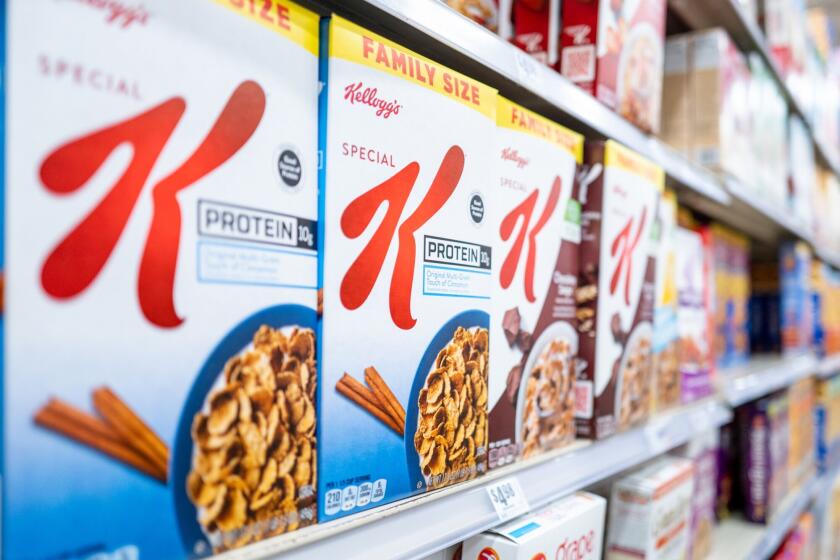Ethanol Brings Drop in Gas Tax
- Share via
SACRAMENTO — As motorists fume over paying the nation’s highest average prices at the pump, the federal tax on most gasoline being sold in California has fallen 3 cents per gallon this year -- although experts doubt that consumers are seeing any of the savings.
The tax break is courtesy of Uncle Sam and the subsidy granted for ethanol use. It comes as oil companies replace the additive MTBE with ethanol, an ingredient distilled primarily from Midwestern corn.
Three pennies per gallon may not seem like much. But Californians consume 16 billion gallons of gas a year. Though not all gasoline contains ethanol because production is not yet in full swing, the potential tax savings for consumers could exceed $330 million annually -- if the tax break trickles down.
“My guess is that the market bears whatever it bears,” Senate Energy Committee Chairwoman Debra Bowen (D-Marina del Rey) said last week. Oil companies “charge whatever they can.”
David Hackett, president of Stillwater Associates, an energy consulting firm that studied ethanol supplies for the California Energy Commission, said: “They’re putting it in their pocket. They set the price of gas where everyone else does.”
At the start of his administration, Gov. Gray Davis decreed that the oil industry must cease adding the chemical compound MTBE to gasoline. MTBE causes gasoline to burn more completely and probably helps reduce air pollution. But it also fouls groundwater and lakes. In its place, oil companies, following a federal requirement, now blend gasoline with ethanol, which also reduces air pollution but does not pollute groundwater.
The run-up in gasoline prices roughly coincides with the switch to ethanol, though oil industry executives and other experts cite other causes. Political events in the Middle East and Venezuela slowed imports, and the switch to ethanol caused disruptions at refineries.
Al Jessel, senior fuels policy advisor for Chevron-Texaco, said that although the ethanol tax break is “part of the cost equation,” it may or may not play a roll in pump prices.
“Prices are set by supply and demand and competition,” Jessel said. “Prices are set by looking at the competition and deciding where we want to be, and it has nothing to do with the cost.”
In a memo explaining the tax break to the Senate Energy Committee, the Energy Commission said it is “unclear how the refiners handle this reduced tax that they are required to collect and pay to the federal government.”
“In one case that we are aware of,” the memo added, when the ethanol-gasoline was delivered to the retailer, the lower 15.4-cent federal tax “was noted, but the wholesale price increased 3 cents.”
The Energy Commission, which tracks gasoline prices, said some refiners have been producing ethanol-gasoline for several months. About 80% of the gasoline now sold contains ethanol.
“One, however, should not assume that the consumers will see the benefit of this federal tax reduction on a gallon of gasoline,” the memo said.
The Energy Commission breaks down the cost of gasoline like this: For gasoline selling at the average price of $2.14 per gallon for regular, the cost of crude oil amounts to 82 cents; oil company refinery costs and profit margin add an additional 65 cents; and gas station dealers receive 15 cents.
State and federal taxes account for the rest. On a gallon of gasoline, the state charges an excise tax of 18 cents. Until recently, the federal government charged a separate excise tax of 18.4 cents per gallon, although the federal tax fell by three pennies because of the ethanol subsidy.
State and federal excise tax money is earmarked for transportation programs, and is unaffected by spikes in gasoline prices.
The excise tax is not the only levy on gasoline. The state imposes a separate sales tax on gas, as it does on most consumer products, averaging 0.792 cents per $1. With gasoline selling for $2.14, the state collects about 16 cents for each gallon sold, or 40% more than it was collecting when the cost of filling a tank with regular was $1.60 per gallon.
More to Read
Inside the business of entertainment
The Wide Shot brings you news, analysis and insights on everything from streaming wars to production — and what it all means for the future.
You may occasionally receive promotional content from the Los Angeles Times.










